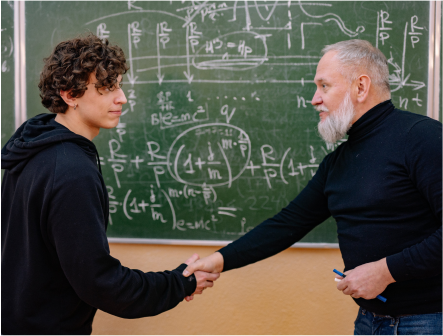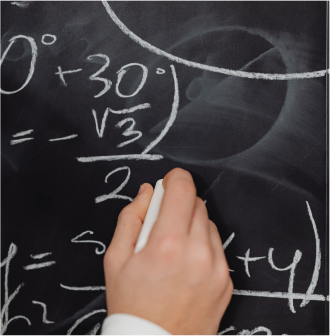
Academics
Mathematics
Mathematics
Mathematics promotes creative and logical reasoning about problems in the physical and social world and in the context of Mathematics itself. Competency in mathematical process skills such as investigating, generalising and proving is more important than the acquisition of content knowledge for its own sake.
Mathematics deals with the formal, more abstract mathematical concepts, with the main focus being on Algebra, Calculus, Trigonometry, Analytical Geometry, Statistics, Space and Shape, Euclidean Geometry and Probability. These topics are often integrated.
Universities which require Mathematics as an entrance requirement for a specific course usually require that a minimum of 50% for Mathematics is achieved just to qualify. Some specialised courses may require minimums of as high as 80%. Mathematics is an essential element in the curriculum of any learner who intends to pursue a career in the sciences, in engineering, in accounting or in technology. It is an important tool for creating, exploring and expressing theoretical and applied aspects of the sciences.
Please be very realistic. Our experience has been that Grade 9 learners who struggle with Algebra, and who achieve below 50% for Mathematics in Grade 9, face an uphill battle with Mathematics in Grade 10 and beyond. The difficulty level of the course increases each year. Forcing a weak student to take Mathematics can result in time spent on this subject causing other subjects to suffer. On the other hand, a student who has natural Mathematical ability should be discouraged from taking Mathematical Literacy as “the easy way out”.
- Mr B Mona (Head of Subject)
- Mr J Sparg
- Mr C Geldenhuys (MIC)
- Miss S Harris
- Mr W Scholl
- Mrs K du Toit
- Mrs C Golding
- Mrs M Miles
- Mr M Norman
- Mr J Jacobs
Mathematics
Mathematics
Mathematics promotes creative and logical reasoning about problems in the
physical and social world and in the context of Mathematics itself. Competency in
mathematical process skills such as investigating, generalising and proving is more
important than the acquisition of content knowledge for its own sake.
Mathematics deals with the formal, more abstract mathematical concepts, with the main focus being on Algebra, Calculus, Trigonometry, Analytical Geometry, Statistics, Space and Shape, Euclidean Geometry and Probability. These topics are often integrated.
Universities which require Mathematics as an entrance requirement for a specific course usually require that a minimum of 50% for Mathematics is achieved just to qualify. Some specialised courses may require minimums of as high as 80%. Mathematics is an essential element in the curriculum of any learner who intends to pursue a career in the sciences, in engineering, in accounting or in technology. It is an important tool for creating, exploring and expressing theoretical and applied aspects of the sciences.
Please be very realistic. Our experience has been that Grade 9 learners who struggle with Algebra, and who achieve below 50% for Mathematics in Grade 9, face an uphill battle with Mathematics in Grade 10 and beyond. The difficulty level of the course increases each year. Forcing a weak student to take Mathematics can result in time spent on this subject causing other subjects to suffer. On the other hand, a student who has natural Mathematical ability should be discouraged from taking Mathematical Literacy as “the easy way out”.
- Mr B Mona (Head of Subject)
- Mr J Sparg
- Mr C Geldenhuys (MIC)
- Miss S Harris
- Mr W Scholl
- Mrs K du Toit
- Mrs C Golding
- Mrs M Miles
- Mr M Norman
- Mr J Jacobs




Mathematical Literacy
The purpose of the subject is to provide learners with an awareness and understanding of the role that Mathematics has in the modern world. Mathematical Literacy focuses on the areas in real life where mathematics is needed.
Number concepts; Financial Maths, including interest, bonds, annuities and income tax; Space, Shape and Measurement, including the design of a low cost house on a budget; Functional Relationships, concentrating on interpreting graphs; Statistics, including identifying misleading statistics in the media.
Mathematical Literacy will enable learners who wish to proceed to disciplines within the Humanities and Social Sciences to deal effectively with mathematically related requirements in these areas. Learners are equipped with the skills and knowledge needed to be able to interact confidently with the mathematics encountered in everyday situations.
While most universities do not allow access to Commerce and Science degrees without Mathematics, some will accept Mathematical Literacy provided that a high level is achieved and a bridging course is followed. Note that entrance requirements are reviewed each year.
- Mr G Bishop
- Mr C Geldenhuys
- Mr W Scholl
- Mrs K du Toit
- Mr D Hartley




Staff
Name & Surname
Name & Surname
Name & Surname
Name & Surname
Name & Surname
Facilities
Facility
Facility
Facility
Curriculum
Lorem ipsum dolor sit amet, consectetur adipiscing elit. Ut elit tellus, luctus nec ullamcorper mattis, pulvinar dapibus leo.